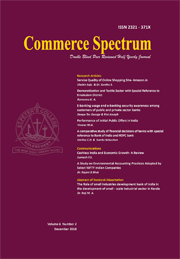Examining the Effect of Talent Management on Organisational Commitment: A Case Based Approach
Author(s) : Bhagyalekshmi P.C. , Dr. Johney JohnsonVolume & Issue : VOLUME 4 / 2016 , ISSUE 2
Page(s) : 8
Abstract
The impact of talent Management (HRM) practices on the affective organisational commitment among employees in the information technology sector was investigated. The study is case based and was carried in Experion Technologies Pvt. Ltd., located in Technopark, Trivandrum, Kerala. Purposive sampling was used to select 58 software engineers who form the sample of the study. Questionnaire was used as the data collection tool. Pearson correlation and Regression analyses were used to draw the relationship between talent management variables and organisational commitment. The results showed that organizational commitment of employees depends more on the selection practices , work environment and recognition practices of the organisation. The results have a great implication for the information technology sector in India.
Keywords
Organizational commitment, HRM practices, IT sector
References
Allen, N. J., & Meyer, J. P. (1990). The measurement and antecedents of affective, continuance, and normative commitment to the organization.Journal of Occupational Psychology, 63,1-18.
Barnard, M. E., & Rodgers, R. A. (2000). How are internally oriented HRM policies related to high-performance work practices? Evidence from Singapore. The International Journal of Human Resource Management, 11, 1017-46.
Bhatnagar, J. (2007). Talent management strategy of employee engagement in Indian ITES employees: Key to retention. Employee Relations, 29: 640–663.
Cappelli, P. 2008. Talent on demand: Managingtalent in an age of uncertainty. Boston, Mass:Harvard Business School Press
Chuai, X., D. Preece, and P. Iles. 2008a. Is talent management really the same as human resource management? The case of MNCs in Beijing. International Journal of Knowledge and Systems Sciences 5, no. 1: 13–22.
Chuai, X., D. Preece, and P. Iles. 2008b. Is talent management just ‘old wine in new bottles’? The case of multinational companies in Beijing. Management Research News 31, no. 12:901–11.
CIPD. 2007. Tansley, C., J. Stewart, P. Turner, C. Foster, H. Harris, and A. Sempik. Talent:Strategy, Management, Measurement. London: CIPD.
CIPD. 2009. Talent Management: Factsheet. London: CIPD. Cohen, A. (1999). Relationships among five forms of commitment: An empirical assessment. Journal of Organizational Behavior, 20(3), 285-308. Collings, D., and K. Mellahi. 2009. Strategic talent management: A review and research agenda.Human Resource Management Review 19, no. 4: 304–13.
Huselid, M. 1995. The impact of human resource management practices on turnover, productivity, and corporate financial performance. Academy of Management Journal 38, no. 3: 635–72.
Iles, P., X. Chuai, and D.A. Preece. 2010. Talent management and HRM in multinational companies in Beijing: Definitions, differences and drivers. Journal of World Business 45,no. 2: 179–89.
Lewis, R., and R. Heckman. 2006. Talent management: A critical review. Human Resource Management Review 16, no. 1: 139–54.
Meyer, J. P., & Allen, N. J. (1997). Commitment in the workplace: Theory, research, and application. Thousand Oaks, CA: Sage.
Mayer, R.C., & Schoorman, F. D. (1998). Differentiating antecedents of organizational
commitment: A test of
March and Simon’s model. Journal of Organizational Behavior, 19(1), 15-28.
Mellahi, K., and D.G. Collings. 2009. The barriers to effective global talent management: The example of corporate elites in MNEs. Journal of Word Business doi: 10.1016/j.jwb.2009.09.018.
Michaels, E., H. Handfield-Jones, and B. Axelrod. 2001. The war for talent. McKinsey &Company, Inc.
Pfeffer, J., & Veiga, J. F. (1999). Putting people first for organizational success. Academy of ManagementExecutive, 13, 37-48.
Tarique, I., and R.S. Schuler. 2010. Global talent management: Literature review, integrative framework, and suggestions for further research. Journal of World Business 45, no. 2: 122–33
.png)

